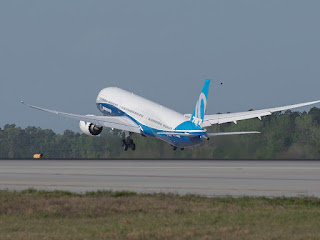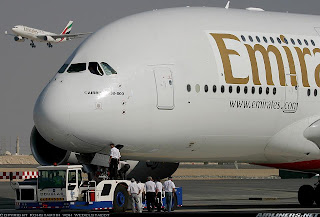The Big Problem Driving the Nigerian Aviation Industry's Pilot Shortage
Suleiman (not real names) has always nursed his childhood dream of becoming an airline pilot. One day, the opportunity came in when the government announced the Niger delta amnesty program for militants and as part of the program the federal government will sponsor some of the ex-militants to become pilots. Suleiman was one of those selected by the government and was sent to South Africa to do his training. 18 months later, he was back with his private pilot license as well as his commercial pilot license. He tried applying for a job with the existing airlines, unfortunately, he wasn't successful. Determined to secure a job with the existing airlines in Nigeria, he flew to Dubai for further training and got his type rating on the Boeing 737. He returned back to Nigeria again and yet he wasn't able to get a job. Eventually, his license expired.
Tunde (not real names) also wanted to become a pilot and to realize his dream, his father took a loan from one of the commercial banks in Nigeria to learn how to fly in Canada. The loan wasn't enough and so to meet up with his training fees, he took odd jobs in Canada whilst still training and was also supported by his Canadian girlfriend. At the end, he got his commercial pilot license but like Suleiman he was unable to secure a job with the airlines. His license expired and he now works as an estate agent.
These stories are the current picture of what unemployed pilots are going through in Nigeria. Nigeria currently has over 300 unemployed pilots and the number keeps growing.
Boeing in its recent forecast had predicted that 1.5 million pilots will be needed globally and in the forecast 22,000 more pilots would be needed. Ordinarily this should sound as a cheering news to the Nigerian aviation industry given the fact that the older generation of pilots are approaching retirement age but in reality, it appears forecast does not apply to Nigeria.
The pilot glut didn't just start overnight. It arises as a result of combination of factors. In the era of Nigeria Airways, the number of pilots was significantly lower compared to now. If you were a newly minted pilot in the Nigeria Airways days, if you do your homework properly, you are almost guaranteed a job with the national carrier. Things are no longer the same again. The Nigerian aviation industry is facing a big challenge. So where did the pilots come from? What led to the rise in the number of unemployed pilots?
First due to the economic downturn in Nigeria, airlines are struggling with high exchange rates at the moment. Most financial trans actions in the Nigerian aviation industry is done in the dollar. Training of pilots, aircraft maintenance, lease payments, insurance payments and aircraft purchases are done in dollar. Airlines in Nigeria are not financially buoyant enough to handle this and add the finance of training a fresh pilot right to his type rating that's a lot of money.
Secondly, these airlines are undercapitalized and they have a very small fleet size. The reason for this small fleet size is because we don't have a proper legal framework for aircraft financing in Nigeria. The Nigerian Civil Aviation Act 2006 appears to be silent on this. This explains why airlines cannot afford to acquire new planes. The bank interest rate is scary. Apart from Arik Air that has a fleet of 28 airplanes, the average fleet of aircraft belonging to Nigerian airlines ranges from 2 to 5. Add the entire fleet of all the 8 airlines operating in Nigeria, they are not even up to hundred. They cannot even match with the major airlines in Europe and America. With the low fleet size of the airlines, it is impossible for the airlines to employ over 500 pilots. More hands, fewer airplanes. There are more people than the available jobs.
Thirdly, the cost doing a type rating for a newly minted pilot is about $30,000 depending on the aircraft. Considering the cost of doing a type rating for a newly minted pilot, it makes it easier for airlines to recruit pilots who are type rated. This explains why foreigners are in the cockpit of Nigerian registered planes.
Finally, the terms and conditions of aircraft finance lease obligations especially in the Business Aviation industry (most planes belonging to many of these charter airlines are leased) makes it compulsory for airplanes to be registered in the financing institutions country as a collateral to the lessor. This means that for instance, if a corporate airline leases an aircraft from a financing institution in Europe, the plane must remain registered in Europe. Consequently, the plane must be crewed by Europeans. However, a Nigerian pilot can only fly such aircraft provided his license was issued by the European Aviation Safety Authority. This why we have expats flying the corporate jets in Nigeria and it also explains why it will be difficult for newly minted pilots to get a job.
Pilot training is very expensive. It ranges from $45000 to $100,000 when you add the type rating to it and this makes it annoying that after the huge investment a newly minted pilot cannot get a job.
Airlines around the world prefer to recruit pilots with experience. Where do newly minted pilots with just 250 hours of flying get the experience from? Ideally, newly minted pilots can get experience by being a certified flight instructor or actually fly a general aviation aircraft but unfortunately unlike what obtains in Europe and America, we cannot boast of a general aviation industry, this could have gone a long way in keeping the over 300 unemployed pilots busy.
Now what's the answer? It takes a strong determination for us to overcome the challenge. Nigeria needs more pilots but unfortunately, its airlines are flying on broken wings. The answer is for the airlines to recapitalize, provide a good aircraft financing framework so that airlines will be able to acquire new airplanes. If airlines acquire more planes it means, there will be more jobs for the pilots and the demand for pilots will increase.
The government needs to bring out favorable policies that will make the airlines profitable. There is a need to reduce the tax burden imposed on the airlines.
There is also need to develop the general aviation industry. We don't have a vibrant general aviation industry. The general aviation industry if developed can create jobs for pilots as well.
Like I said it takes the determination of government to make this happen.
Being a commercial airline pilot is an extraordinary profession. Factor in all the negatives, it is still one of the most rewarding, challenging and inspiring careers available. It's incomparable to put on an extraordinary machine into the air and move in billions of passengers to their respective destinations. It is an epitome of what the human mind is capable of and the pilots are ultimately in charge of the outcome.
The Nigerian airlines themselves need to work on their weak corporate governance system as well. Their weak corporate governance is contributory to their current state. They also need to create an environment for the pilots to shine




Comments
Post a Comment